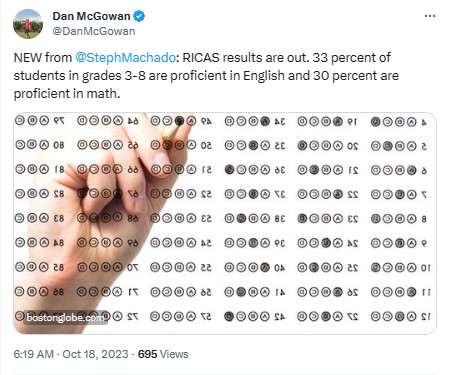Hamas executed a brutal sneak attack with no declaration of war against innocent people in their homes and at a music festival. The big complaint against Israel’s response, recently, has been that one day was not enough warning for people to evacuate an area they were planning to attack after a declaration of war.
Which of those seems more likely to blow up a hospital or the vehicles of those attempting to evacuate and blame it on the enemy?
[Open full post]Dan McGowan notes that new standardized test scores are out for Rhode Island public schools, and they’re not good.

Elsewhere, he finds a silver lining in the fact that English-language learners do better at English and are nearly caught up in math, but it seems like an indication of how poorly the schools are doing that native English speakers can’t keep up with those who are new to the language. In both subjects, in fact, we should question whether it’s a success that numbers are so low even those with language challenges are able to match them.
[Open full post]On WNRI 1380 AM/95.1 FM, John DePetro and Justin Katz discuss:
- Hints (but not much more) of surprise at the monster progressives have created
- The media’s inability to find a difference between Leonard and Amo on Israel
- The sense that progressives are fine with Hamas-style decolonization (in Israel and maybe here)
- A podcaster activist
- Unhinged prices for political appointees
- Polisena’s familiar McKee retort
Featured image by Justin Katz using Dall-E 3, with inspiration from a frighteningly relevant 2001 short story.
[Open full post]Nonetheless, it’s worth noting this mild corrective from Brown University’s Dr. Ashish Jha on Newsmakers, as summarized in a recent “Nesi’s Notes” column:
“I think we all in public health could have done a better job of communicating with more humility about what we knew and didn’t know. There was a desire by some people to act more certain than they were.” But he also thinks major damage was done by the decision to effectively impose a nationwide lockdown in the spring of 2020, which he blames in large part on a lack of visibility caused by the botched rollout of testing. “The virus was in big numbers here in Rhode Island, Boston, New York, Washington, D.C.,” he recalled. “There was almost none in Mississippi, almost none in Montana. And because we did not know that, we had to do a nationwide lockdown. And people in Mississippi rightly said, ‘Wait, you’re doing all these public health measures — our hospitals are empty, I don’t know anybody who’s got COVID, no one’s getting sick, this makes no sense.’ And that very blunt response actually I think was the basis for a lot of people losing faith in the public-health response.”
Notice two major omissions, though. The first is from Jha, who doesn’t elaborate on how the overreactors will be held accountable. As always, the experts get an unlimited “oops” card.
The corresponding second omission is from Nesi and the rest of the media. Some folks had it right at the time. A healthy media system would be rewarding them for that, now.
[Open full post]As people newly look up from their lives to wonder about the craziness with which we’re surrounded — from collegiate support for Hamas to economic ignorance to scientific illiteracy to an inability to grapple with logic — they should turn their gaze toward our schools. Consider this recent Boston Globe column from Dan McGowan:
The state’s most recent report card shows that 81 percent of students [at Providence’s Mount Pleasant High School] were chronically absent during the 2021-2022 school year, zero percent of students were considered proficient in math, and the four-year graduation rate was 67 percent.
But here’s the worst part: McGowan puts those numbers forward to support one side over the other in a dispute over school building construction. In other words, the discussion is miles and miles away from where it ought to be, which is the use of our education to provide a jobs program for labor unions and indoctrinate into progressive causes.
The building won’t matter until that’s fixed, and it’s not even a topic of conversation.
[Open full post]On WNRI 1380 AM/95.1 FM, John DePetro and Justin Katz discuss:
- Gabe Amo undermines the purpose of debates
- Matt Gaetz takes Congress in a Rhode Islandish direction
- Cranston’s council election results offer a red flag for the future
- Magaziner’s support for “Eat the Rich”
- Middle East atrocities and progressive revelations
Featured image by Justin Katz using Firefly.
True enough that it’s important to be skeptical of all reports, particularly the most horrific, at a time like this, but still… there is an air around some of those insisting that the story is not yet verified that implies if this story isn’t true, the whole atrocity is not that bad. Psychologically, they seem to hope for excessive accusations so that they can discount anything below that mark as within tolerable bounds of unspeakable horror.
[Open full post]… the explanation might be more than silent discomfort with a faction of their tribe’s doing something nakedly evil. To progressives, this sort of thing must happen and is expected. Maybe they find it lamentable (or maybe not), but they see it as inevitable on the path to their vision of justice.
Tom Holland argues, in his excellent history of Christianity, Dominion, that the Woke represent a distorted offshoot of the faith. Just so, through their Marxist perversion, they carry forward the expectation for which Jesus prepared his followers: “when you hear of wars and revolts, do not be alarmed; for these things must take place first.”
This is the deeper truth of their hypocritical responses to current events. The revolution is everything, and they’ll respond the same when it comes for you. The real question is whether enough people’s eyes are opened before it’s too late, and I’m not seeing it, even now. So, the progressives will go about their lives… and wait.
[Open full post]Whether it’s deliberate manipulation or just a sloppy resort to groupthink, Nancy Lavin’s recent article on Rhode Island Current is a good illustration of how issues can be framed to support the preferences of the powerful. Note this section:
Proponents tout these expansions as ways to improve voter turnout and access while easing the pressure on election administrators on Election Day itself.
But getting voters to embrace those changes remains a work in progress.
Distrust of mail-in ballots continues, thanks in part to misinformation spread during the 2020 presidential election.
Astonishingly, Lavin goes on to cite mail-ballot-queen Ana Quezada’s campaign manager, Justin Roias, as an expert, but without bothering to find anybody with a contrary view.
In particular, note the framing. Innovations in voting are simply “ways to improve voter turnout and access while easing pressure on election administrators.” See, it’s just a practical change to encourage civic engagement, and suspicion of these innovations has to do with “misinformation,” meaning Donald Trump and those wicked MAGA Republicans.
Apart from failing to include alternative views, Lavin doesn’t check basic facts from the activists. For instance, one claim by which Roias minimizes his candidate’s peculiar mail-ballot success is that “Quezada’s supporters were older and may have had mobility or transportation limitations,” but the mail ballot data doesn’t support his suggestion, and it’s easy to check.
Data from the Secretary of State’s office shows that the average age of mail-ballot voters is 67. In precincts in which Quezada had a majority of mail ballot votes, it’s 59. Looking at ballots that appear to have been picked up by her husband, the average age is 51. Make of these facts what you will; I offer them as one example of a statement an obviously biased source provided that the journalist did not verify.
As with every issue on which journalists appear to take the progressive, Democrat point of view for granted, one gets the feeling that they find the “distrust” from the other side to be inexplicable because they’ve declined to investigate whether it’s justified.
Featured image by Paulette Vautour on Unsplash.
[Open full post]A recent teapot tempest in the Censorship Wars (at least the skirmishes over keeping arguably pornographic and sex-promoting work out of elementary school libraries) has to do with parents’ objecting to a graphic novel version of Ann Frank’s diary. You can dig multiple layers into the story, though, for a more-full picture.
The first layer, which is the one I’ve seen sympathetic parents offering, is to note that the graphic novel includes sections in which Anne fantasized about kissing her friend and discussed the details of her private areas, including manual explorations that young children needn’t ponder. This has obvious implications for those concerned about the sexualization of children. Inasmuch as a graphic novel is not word-for-word, such details could have been excluded. To my mind, however, the second layer is the clincher.
Not surprisingly, when the diary was first made public decades ago, somebody (probably Anne or her father, perhaps at her request) glued paper over these sections so they could not be seen. Little did that protector expect humanity would develop technology to see through the barrier without ruining the underlying text.
In other words, these pages were never meant to be seen, and it’s more than likely Anne would have been mortified to know not only that such secrets were available for the adult public of the world to know, but that school children might be encountering them… in school. Think of the prudent barriers through which we’re blasting, these days. Not only did the keepers of Anne’s legacy peak into the private parts of her diary never intended for other eyes, but they’ve published them for the world to see. Next, the graphic novel writer and publisher made the conscious decision to include these sections in a cartoonish text for children, and radicals insist that any parents who object to their use in public schools are censorious fascists.
My view is that this is more like an inversion of the truth. Those hoping to enlist Anne in their cultural and political battles are abusing and violating her for the purposes of propaganda, which has a terrifyingly familiar ring.
Featured image by Justin Katz using Dall-E 3 on ChatGPT.
[Open full post]




